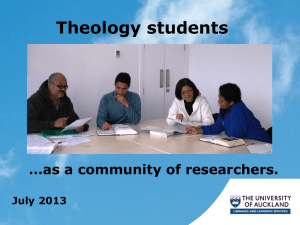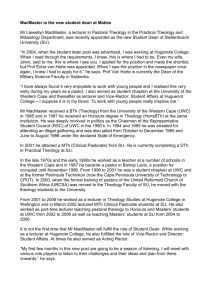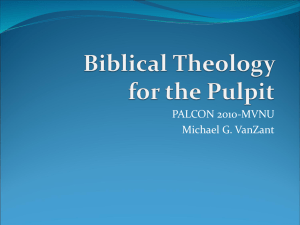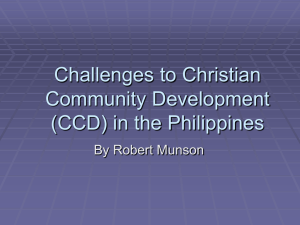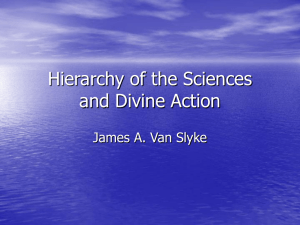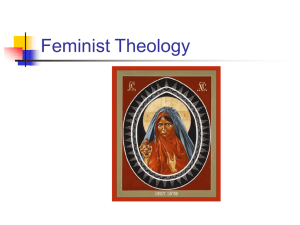Module S/PT3902
advertisement
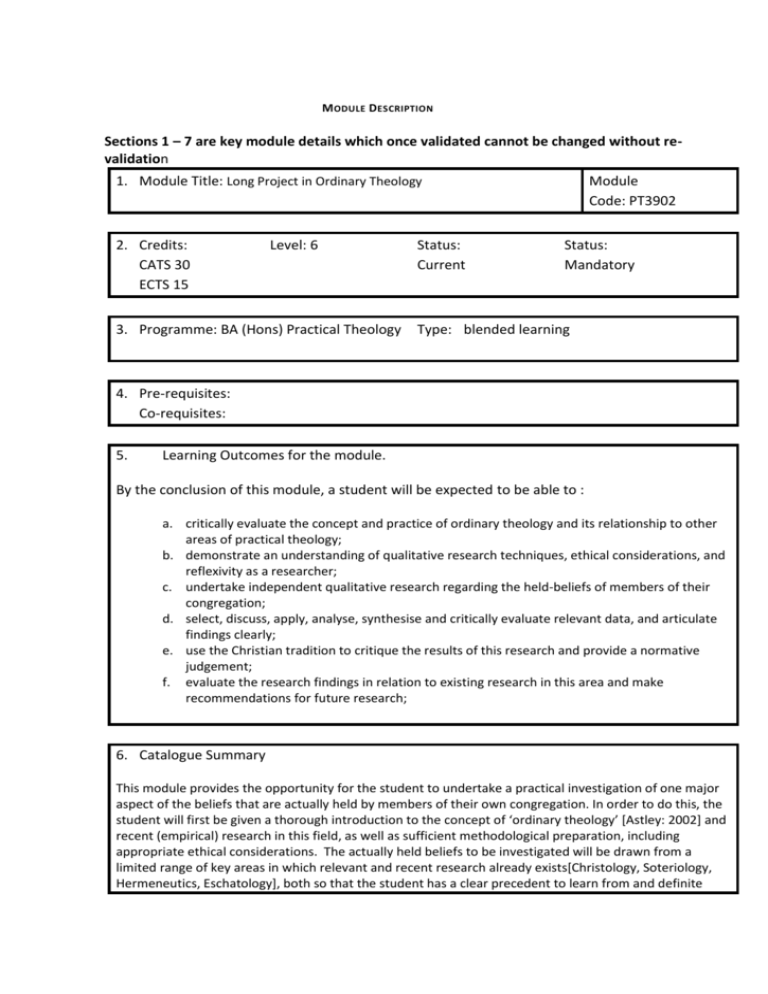
M ODULE D ESCRIPTION Sections 1 – 7 are key module details which once validated cannot be changed without revalidation 1. Module Title: Long Project in Ordinary Theology 2. Credits: CATS 30 ECTS 15 Level: 6 3. Programme: BA (Hons) Practical Theology Status: Current Module Code: PT3902 Status: Mandatory Type: blended learning 4. Pre-requisites: Co-requisites: 5. Learning Outcomes for the module. By the conclusion of this module, a student will be expected to be able to : a. critically evaluate the concept and practice of ordinary theology and its relationship to other areas of practical theology; b. demonstrate an understanding of qualitative research techniques, ethical considerations, and reflexivity as a researcher; c. undertake independent qualitative research regarding the held-beliefs of members of their congregation; d. select, discuss, apply, analyse, synthesise and critically evaluate relevant data, and articulate findings clearly; e. use the Christian tradition to critique the results of this research and provide a normative judgement; f. evaluate the research findings in relation to existing research in this area and make recommendations for future research; 6. Catalogue Summary This module provides the opportunity for the student to undertake a practical investigation of one major aspect of the beliefs that are actually held by members of their own congregation. In order to do this, the student will first be given a thorough introduction to the concept of ‘ordinary theology’ [Astley: 2002] and recent (empirical) research in this field, as well as sufficient methodological preparation, including appropriate ethical considerations. The actually held beliefs to be investigated will be drawn from a limited range of key areas in which relevant and recent research already exists[Christology, Soteriology, Hermeneutics, Eschatology], both so that the student has a clear precedent to learn from and definite results to compare their own findings against. Such an approach will also enable the existing body of empirical research to be built upon, and verified or questioned. 7. Assessment Pattern Written Assignment (2500 words) Project Report (6000 words) Weight % 30 70 Pass Req agg Comments 8. Indicative Tutorial Team Rev Dr Michael Armstrong Rev Dr Graham Adams 9. Indicative Learning and Teaching Activities Activity Type HESA Category Lecture Scheduled Seminar Tutorial Practical classes and workshops Supervised time in studio/workshop Fieldwork External visits Work-based learning Project supervision Demonstration Sub-Total Placement Placement Year abroad Sub-Total Guided independent study Independent 30 credits x 10 notional hours = 300 Total Hours Hours 3 6 3 0 0 0 0 0 6 0 18 0 0 0 282 300 10. Sample Assignments Assignment 1 (2500 words) Critically evaluate the concept and practice of ordinary theology and provide a rationale for how this approach will be applied to your chosen field of investigation. Justify your methodology for the investigation of held-beliefs within your congregation and provide evidence of appropriate ethical consideration. Assignment 2 (6000 words) The project report will present the research findings, critique this data and draw conclusions about what they can tell us in relation both to the Christian tradition and existing empirical research, provide critical reflections on the methodology and the experience of the participants, and make relevant suggestions for future research. 11. Indicative Outline Content Unit 1: Ordinary Theology – an overview. Unit 2: How do we know it is theology at all? Does revelation continue? Unit 3: Researching ordinary theology. Existing research data. Unit 4: Qualitative research – methods, techniques and considerations. Session 1: Lecture – An introduction to Ordinary Theology: strengths and weaknesses and its relationship to other areas of practical theology. Session 2: Lecture –the importance of the Christian tradition in critiquing its results. The skilled theological reflector and the ‘people’s theologian’. Session 3: Lecture - Recent ordinary theology research. Areas to choose from. Session 4: Lecture – Qualitative research techniques. Reflexivity and ethical considerations. The benefits of listening, and ‘listening theologically’. Dual role of pastor-researcher. Session 5: Seminar – Bringing together a research proposal. Session 6: Seminar – Getting underway with the research. Issues, problems and tips. 12. Indicative Reading Please note that resources, including course notes/presentations, papers and discussions, as well as access to online journals, are available through the University of Winchester Learning Network: www.winchester.ac.uk. ARCS (2008), ‘Living Church in the Global City: Theology in Practice’, Research Report http://www.rcc.ac.uk/downloads/pdf_files/ARCS%2520Report%25202008.pdf Armstrong, Michael R., ‘Lay Christian Views of Life After Death: A Qualitative Study and Theological Appraisal of the “Ordinary Eschatology” of Some Congregational Christians’ (University of Durham: DThM thesis, 2011) [http://etheses.dur.ac.uk/3274/] Armstrong, Michael R., ‘Ordinary Theologians as Signal Processors of the Spirit’ and ‘Extraordinary Eschatology: Insights from Ordinary Theologians’ in J. Astley and L. Francis (eds.), Exploring Ordinary Theology: Everyday Christian Believing and the Church (Aldershot: Ashgate, 2013) Astley, Jeff, Ordinary Theology: Looking, Listening and Learning in Theology (Aldershot: Ashgate, 2002) Astley, Jeff, and Ann Christie, Taking Ordinary Theology Seriously (Cambridge: Grove Books, 2007) Astley, Jeff, and Leslie J. Francis (eds.) Exploring Ordinary Theology: Everyday Christian Believing and the Church (Aldershot: Ashgate, 2013) Brown, David, Tradition and Imagination: Revelation and Change (Oxford: Oxford University Press, 1999) Cameron, Helen et al., Studying Local Churches: A Handbook (London: SCM, 2005) Cameron, Helen, and John Reader, Victoria Slater, Christopher Rowland, Theological Reflection for Human Flourishing: Pastoral Practice and Public Theology (London: SCM, 2012) Christie, Ann, and Jeff Astley, 'Ordinary Soteriology: A Qualitative Study', in Leslie J. Francis, Mandy Robbins and Jeff Astley (eds.), Empirical Theology in Texts and Tables: Qualitative, Quantitative and Comparative Perspectives (Leiden: Brill, 2009)177-96. Christie, Ann, Ordinary Christology: Who Do You Say I Am? Answers from the Pews (Aldershot: Ashgate, 2012) Graham, E., H. Walton and F. Ward (2005), Theological Reflection: Methods, London: SCM Press. Graham, Elaine (2011), ‘Frailty and Flourishing: Good News for Humanity – Response to Alister McGrath’, Practical Theology, 4, 3: 333–8. Green, Laurie, Let’s do Theology: Resources for Contextual Theology (London: Mowbray, completely revised and updated new edition, 2009) Lindbeck, George A. (1984), The Nature of Doctrine: Religion and Theology in a Postliberal Age, London: SPCK. Lindbeck, George A. (1996), ‘Spiritual Formation and Theological Education’, in Jeff Astley, Leslie J. Francis, and Colin Crowder (eds.), Theological Perspectives on Christian Formation: A Reader in Theology and Christian Education, Grand Rapids, MI: Eerdmans. McGrath, Alister (1997), The Genesis of Doctrine: A Study in the Foundations of Doctrinal Criticism , Grand Rapids, MI: Eerdmans. Miller-McLemore, Bonnie J. (ed.), The Wiley-Blackwell Companion to Practical Theology (Oxford: Wiley Blackwell, 2011) Nash, Sally, and Paul Nash, Tools for Reflective Ministry (London: SPCK, 2009) Newman, John Henry (1859), ‘On Consulting the Faithful in Matters of Doctrine’, The Rambler, July 1859, reproduced in John Henry Newman, Conscience, Concensus and the Development of Doctrine: Revolutionary Texts by John Henry Cardinal Newman, ed. James Gaffney, (New York: Image/Doubleday, 1992), 392-428. http://www.fordham.edu/halsall/mod/newman-faithful.html (30 June 2011) Osmer, Richard R., Practical Theology: An Introduction (Grand Rapids, MI.: Eerdmans, 2008) Rogers, Andrew, ‘Reading Scripture in Congregations: Towards an Ordinary Hermeneutics’, in L. Bretherton and A. Walker (eds.), Remembering our Future: Explorations in Deep Church (Milton Keynes: Paternoster, 2007) 81-107. Rogers, Andrew, Congregational Hermeneutics: How do we read? (Aldershot: Ashgate, forthcoming) Rogers, Andrew, 'Congregational Hermeneutics: Towards Virtuous Apprenticeship', in J. Astley & L. Francis (eds.), Exploring Ordinary Theology: Everyday Christian Believing and the Church (Aldershot: Ashgate, 2013) Rogers, Andrew, H+ Making Good Sense of the Bible (Swindon: Bible Society, 2011) Thompson, Judith, and Stephen Pattison and Ross Thompson, SCM Studyguide to Theological Reflection (London: SCM, 2008) Village, Andrew, The Bible and Lay People: An Empirical Approach to Ordinary Hermeneutics (Aldershot: Ashgate, 2007) Voas, David and Alasdair Crockett ( 2005), ‘Religion in Britain: Neither Believing nor Belonging’, Sociology 39.1, 11-28. Ward, Pete (ed.), Perspectives on Ecclesiology and Ethnography (Grand Rapids, MI: Eerdmans, 2012) Ward, Pete and Sarah Dunlop (2011), ‘Practical Theology and the Ordinary: Visual Research among Migrant Polish Catholic Young People’ Practical Theology 4.3, 295-313 Ward, Pete, Participation and Mediation: A Practical Theology for the Liquid Church (London: SCM, 2008)

